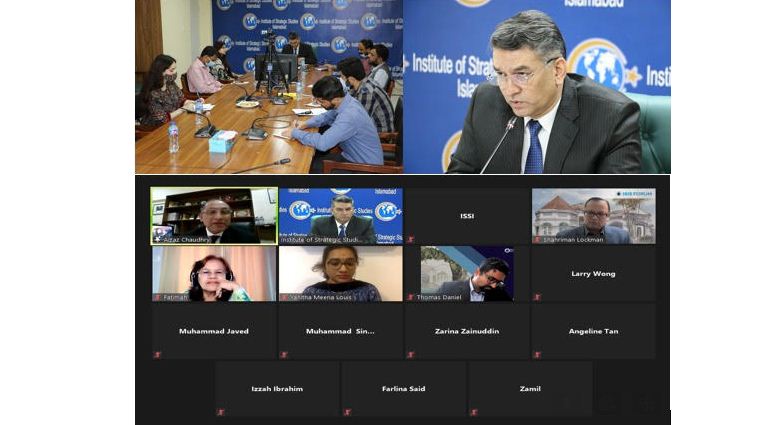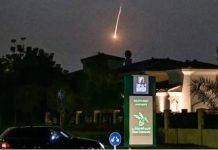ISLAMABAD – The Institute of Strategic Studies Islamabad (ISSI) held its first bilateral dialogue with the Institute of Strategic and International Studies (ISIS) based in Malaysia today. The theme of the dialogue was Food Security Cooperation under the Organisation of Islamic Countries (OIC) framework. ISSI side was led by Ambassador Aizaz Ahmad Chaudhry and ISIS Malaysia was led by Mr. Shahriman Lockman, Director of Chief Executive’s Office ISIS. Meanwhile, distinguished panel of speakers included; Assistant Professor Arid Agriculture University Rawalpindi; Professor Fatimah Mohamed Arshad Head Agriculture and Food Security Cluster, Academy of Professors of Malaysia (APM); Ms. Yanitha Meena Louis Researcher at ISIS; and Ms. Ume Farwa, Research Associate ISSI. Dr. Talat Shabbir, Director China-Pakistan Study Center (CPSC) at the Institute moderated the dialogue.
Ambassador Aizaz Chaudhry, Director General ISSI, in his opening remarks stated that earlier “OIC focused more on political issues but recently there has been much talk on non-traditional issues, and food security is one such topic which is a win win subject for discussion and dialogue”. For ensuring food security, Ambassador Chaudhry stated that, “we need to increase yield, supplies and for that we need to invest more in R&D in the context of food sufficiency, crop production, climate change etc.”
Meanwhile, Mr. Shahriman Lockman, Director of Chief Executive’s Office ISIS, speaking on behalf of Mr. Herizal Hazari Chief Executive said that “COVID-19 pandemic has been the worst nightmare for food security in several conflict ridden OIC countries”. And for OIC countries critical challenge is ensuring “supply chain stability”.
Earlier in his welcome remarks, Dr. Talat Shabbir Director CPSC, said that sustainable food security is at the core of economic development of any country, and OIC-2025 Plan of Action strongly emphasizes on the development of agriculture sector to attain food security and enhance growth and prosperity across the Muslim world.
This was followed by a working session where four learned experts made presentations and exchanged views on the theme. Speaking at the occasion, Ms. Ume Farwa, Research Assiociate, stated that “the most important source of food security is agriculture, yet in many countries agricultural sector is still not utilized to its potential. She also highlighted the crucial role being played by the OIC for promotion of food security and argued that OIC should treat its members preferably according to their needs.”
Similarly, Ms. Yanitha Meena, an expert at ISIS deliberated on OIC initiatives for empowering South Asia and South East Asian countries in the realm of food security. She highlighted that OIC member states are engaged in multilateral cooperation and can leverage their respective experiences. She emphasized on the need to have greater political will, cooperation and synergy among members’ states of OIC for achieving food security for all.
Dr Mukhtar Ahmed, Assistant Professor at Arid Agriculture University, in his presentation made the case for effective policy coordination between member states. He stated that OIC countries accounts for 28.8% of agricultural area of the world and 13.5% of the world’s total renewable water resources. And effective and sustainable agricultural management and policy-making could play a pivotal role in enhancing the development efforts of the Member States.
Meanwhile, Professor Fatimah Mohamed Arshad Head of Agriculture and Food Security Cluster at APM, stated that “food systems are left behind in economic growth so we need a new virtuous cycle to affect the performance of whole food systems”. As for OIC members “various challenges faced by OIC include, every country for itself thinking, thus, no ‘one’ measure fits all, and coordination at all levels is required to prioritize short-term and long-term priorities”
These presentations were followed by a brief Q&A session. The discussion was insightful and constructive.
Dr. Talat Shabbir, Director CPSC, concluded the dialogue by thanking speakers and participants for their valuable input.

















